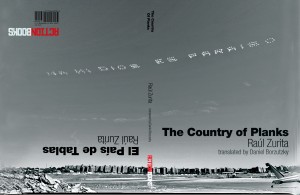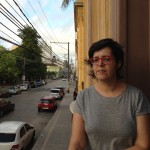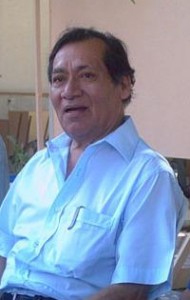“A Single Woman’s Room” by Yi Lei, translated from the Chinese by Changtai Bi and Tracy K. Smith
Yi Lei’s poems are expansive. In her many long sequences, the reader encounters a number of ruminations that spring associatively from one another and that work to create an unswerving emotional insistence—a fidelity to feelings of love, longing, memory and loss. She is a poet of passion and surprise, a master of quick shifts in energy, imagery and dramatic pitch. In “A Single Woman’s Room,” her most famous poem, Yi Lei creates an extended portrait of a speaker whose relentless availability to love remains undiminished, even in the wake of betrayal. Such urgency speaks not solely to the private realm; the passion, courage, resilience and resistance alive in these poems delineate a conscience and a consciousness deeply committed to freedom of all kinds, and to pushing against the limitations of convention.
–Tracy K. Smith
[Pictured from left: Yi Lei, Tracy K. Smith, & Changtai Bi.]
独身女人的卧室
by Yi Lei1.镜子的魔术
你猜我认识的是谁
她是一个,又是许多个
在各个方向突然出现
又瞬间消隐
她目光直视
没有幸福的痕迹
她自言自语,没有声音
她是立体,又是平面
她给你什么你也无法接受
她不能属于任何人
——她就是镜子中的我
整个世界除以二
剩下的一个单数
一个自由运动的独立的单子
一个具有创造力的精神实体
——她就是镜子中的我
我的木框镜子就在床头
它一天做一百次这样的魔术
你不来与我同居
2.土耳其浴室
这小屋裸体的素描太多
一个男同胞偶然推门
高叫“土耳其浴室”
他不知道在夏天我紧锁房门
我是这浴室名副其实的顾客
顾影自怜——
四肢很长,身材窈窕
臀部紧凑,肩膀斜削
碗状的乳房轻轻颤动
每一块肌肉都充满激情
我是我自己的模特
我创造了艺术,艺术创造了我
床上堆满了画册
袜子和短裤在桌子上
玻璃瓶里迎春花枯萎了
地上乱开着暗淡的金黄
软垫和靠背四面都是
每个角落都可以安然入睡
你不来与我同居
3.窗帘的秘密
白天我总是拉着窗帘
以便想象阳光下的罪恶
或者进入感情王国
心理空前安全
心理空前自由
然后幽灵一样的灵感纷纷出笼
我结交他们达到快感高潮
新生儿立即出世
智力空前良好
如果需要幸福我就拉上窗帘
痛苦立即变成享受
如果我想自杀我就拉上窗帘
生存欲望油然而生
拉上窗帘听一段交响曲
爱情就充满各个角落
你不来与我同居
4.自画像
所有的照片都把我丑化
我在自画像上表达理想
我把十二种油彩合在一起
我给它起名叫P色
我最喜欢神秘的头发
蓬松的刘海像我侄女
整个脸部我只画了眉毛
敬祝我像眉毛一辈子长不大
眉毛真伟大充满了哲学
既不认为是,也不认为非
既不光荣,也不可耻
既不贞洁,也不淫秽
既不是生,也不是死
我把自画像挂在低矮的墙壁
每日朝见这唯一偶像
你不来与我同居
5.小小聚会
小小餐桌铺一块彩色台布
迷离的灯光泄在模糊的头顶
喝一口红红的酒
我和几位老兄起来跳舞
像舞厅的少男少女一样
我们不微笑,沉默着
显得昏昏欲醉
独身女人的时间像一块猪排
你却不来分食
我在偷偷念一个咒语——
让我的高跟鞋跳掉后跟
噢!这个世界已不是我的
我好像出生了一个世纪
面容腐朽,脚上也长了皱纹
独身女人没有好名声
只是因为她不再年轻
你不来与我同居
6.一封请柬
一封请柬使我如释重负
坐在藤椅上我若有所失
曾为了他那篇论文我同意约会
我们是知音,知音,只是知音
为什么他不问我点儿什么
每次他大谈现代派、黑色幽默
可他一点也不学以致用
他才思敏捷,卓有见识
可他毕竟是孩子
他温柔多情,单纯可爱
他只能是孩子
他文雅庄重,彬彬有礼
他永远是孩子,是孩子
——我不能证明自己是女人
这一次婚礼是否具有转折意义
人是否可以自救或者互救
你不来与我同居
7.星期日独唱
星期日没有人陪我去野游
公园最可怕,我不敢问津
我翻出现存的全体歌本
在土耳其浴室里流浪
从早饭后唱到黄昏
头发唱成1
眼睛唱成2
耳朵唱成3
鼻子唱成4
脸蛋唱成5
嘴巴唱成6
全身上下唱成7
表哥的名言万岁——
歌声是心灵的呻吟
音乐使痛苦可以忍受
孤独是伟大的
(我不要伟大)
疲乏的眼睛憩息在四壁
头发在屋顶下飞像黑色蝙蝠
你不来与我同居
8.哲学讨论
我朗读唯物主义哲学——
物质第一
我不创造任何物质
这个世界谁需要我
我甚至不生孩子
不承担人类最基本的责任
在一堆破烂的稿纸旁
讨论艺术讨论哲学
第一, 存在主义
第二, 达达主义
第三, 实证主义
第四,超现实主义
终于发现了人类的秘密
为活着而活着
活着有没有意义
什么是最高意义
我有无用之用
我的气息无所不在
我决心进行无意义结婚
你不来与我同居
9.暴雨之夜
暴雨像男子汉给大地以鞭楚
躁动不安瞬间缓解为深刻的安宁
六种欲望掺和在一起
此刻我什么都要什么都不要
暴雨封锁了所有的道路
走投无路多么幸福
我放弃了一切苟且的计划
生命放任自流
暴雨使生物钟短暂停止
哦,暂停的快乐深奥无边
“请停留一下”①
我宁愿倒地而死
你不来与我同居
10.象征之梦
我一人占有这四面墙壁
我变成了枯燥的长方形
我做了一个长方形的梦
长方形的天空变成了狮子星座
一会儿头部闪闪发亮
一会儿尾部闪闪发亮
突然它变成一匹无缰的野马
向无边的宇宙飞驰而去
套马索无力地转了一圈垂落下来
宇宙漆黑没有道路
每一步都有如万丈深渊
自由的灵魂不知去向
也许她在某一天夭折
你不来与我同居
11.生日蜡烛
生日蜡烛像一堆星星
方方的屋顶是闭锁的太阳系
空间无边无沿
宇宙无意中创造了人
我们的出生纯属偶然
生命应当珍惜还是应当挥霍
应当约束还是应当放任
上帝命令:生日快乐
所有举杯者共同大笑
迎接又临近一年的死亡
因为是全体人的恐惧
所以全体人都不恐惧
可惜青春比蜡烛还短
火焰就要熄灭
这是我一个人的痛苦
你不来与我同居
12.女士香烟
我吸它是因为它细得可爱
点燃我做女人的欲望
我欣赏我吸烟的姿势
具有一种世界性美感
烟雾造成混沌的状态
寂寞变得很甜蜜
我把这张报纸翻了一翻
戒烟运动正在广泛开展
并且得到了广泛支持
支持的并不身体力行
不支持的更不为它作出牺牲
谁能比较出吸烟的功德与危害
戒烟和吸烟只好并行
各取所需
是谁制定了不可戒的戒律
高等人因此而更加神奇
低等人因此而成为罪犯
今夜我想无罪而犯
你不来与我同居
13.想
我把剩余时间通通用来想
我赋予想一个形式:室内散步
我把体验过的加以深化
我把未得到的改为得到
我把发生过的加以进展
我把未曾有的化成幻觉
不能做的都想
怯于对你说的都想
法律踟蹰在地下
眼睁睁仰望着想
罗网和箭矢失去了目标
任凭想胡作非为
我想签证去想的王国居住
我只担心那里已经人口泛滥
你不来与我同居
14.绝望的希望
这繁华的城市如此空旷
小小的房子目标暴露
白天黑夜都有监护人
我独往独来,充满恐惧
我不可能健康无损
众多的目光如刺我鲜血淋漓
我祈祷上帝把那一半没有眼的椰子②
分给全体公民
道路已被无形的障碍封锁
我怀着绝望的希望夜夜等你
你来了会发生世界大战吗
你来了黄河会决口吗
你来了会有坏天气吗
你来了会影响收麦子吗
面对所恨的一切我无能为力
我最恨的是我自己
你不来与我同居
1986年9月末
① 《浮士德》中浮士德最后的话
② 一半没有眼的椰子:神话传说中鬼把一半没有眼的椰子分给活人,活人就看不到它。
A Single Woman's Room
by Yi Lei1. Mirror Trick
Of course I know her.
She is one and many,
A multitude flashing on, then
Blinking off—on, off—
Watching out from the tidy blank
of her face. She is silent, speaking
With just her mind. She is flesh, a form,
but also flat, a mute screen.
What she offers you, by no means
Should you accept. She belongs to no-one,
sitting like a ghost beyond her own reach.
And yet, she’s there—I mean me—
Behind glass, as if the world has been cleaved,
Though something whole remains,
Roving, free, a voice with poise and pitch.
She’s there—me—snug in the glass,
The little mirror on the bedside
Doing its one trick
A hundred times a day.
You didn’t come to live with me.
2. Turkish Bath
The room is choked with nudes.
Once, a man barged in by mistake
Crying, “Turkish bath!” He had no idea
My door is always locked in this heat,
No idea that I am the sole guest and client,
The chief consort, that I cast my gaze
Of pity and absolute pride across
The length of my limbs—lithe, pristine—
The bells of my breasts singing,
The high bright note of my ass,
My shoulders a warm chord
The chorus of muscle that rings
Ecstatic. I am my own model.
I create, am created, my bed
Is heaped with photo albums,
Socks and slips scatted on a table.
A spray of winter jasmine wilts
In its glass vase, dim yellow, like
Despondent gold. Blossoms carpet
The floor, which is a patchwork
Of pillows. Pick a corner sleep in peace.
You didn’t come to live with me.
3. Curtain Habit
The curtain seals out the day.
Better that way to let my mind
See what it sees (every evil under the sun),
Or to kneel before the heart, quiet king,
Feeling brave and consummately free.
Better that way to let all that I want
And all I believe swarm me like bees,
Or ghosts, or a cloud of smoke someone
Blows, beckoning. I come. I cry out
In release. I give birth
To a battery of clever babies—triplets,
Quintuplets, so many all at once.
The curtain seals in my joy.
The curtain holds the razor out of reach,
Puts the pills on a shelf out of sight.
The curtain snuffs shut and I bask in the bounty
Of being alive. The music begins.
Love pools in every corner.
You didn’t come to live with me.
4. Self-Portrait
The camera snaps. Spits me out starkly ugly.
So I set out to paint the self within myself.
It took twelve tubes, blended to a living tint,
Before I believed me. I named the mixture Color P.
The hair—curious, unlikely—is my favorite,
The same fluff of bangs tickling my niece’s face.
And my eyebrows are wide as hills. They swallow everything.
They were a feat. They do not impress me as likely to age.
They are brimming with wisdom. Neither slavish nor stern.
Not magnificent, but not the kind made to crumple in shame.
Not prudish. Unwilling to arch and beckon like a whore’s.
They skitter away from certainties like alive or dead.
My self-portrait hangs on the narrow wall,
And I kneel down to it every day.
You didn’t come to live with me.
5. Impromptu Party
The little table is draped with a festive cloth, and
Light blurs out from a single lamp, making us fuzzy.
A sip of red wine, and I rise to my feet. We are
Dancing, my guests and I, like kids in a ballroom.
We don’t smile or even speak. We’ve had a lot to drink.
To a single woman, time is like a scrap of meat:
Nothing you can afford to give away. I want
To hold it in my lap, Time, that sneak, that thief already
Scheming to break free. Please—I beg
Upon the magnificent extravagance of my beloved stilettos,
I want the world back. I’ve been alive—could it be?—
Near a century. My face has closed up shop.
My feet are a desolate country.
For a single woman, youth is a feast that lasts
Only until it is gone.
You didn’t come to live with me.
6. Invitation
When it arrived, I was interrupted by relief,
Sitting in my rattan chair, feeling the wind ease in
Through the hole in my life.
I only said yes because of his dissertation. Friends,
Nothing more. We talked—he talked—about modernism,
Black humor. But always at a distance from reality.
Why didn’t he ask anything of me?
Tender and petulant, he struck me as cute.
But at heart, only a very well-behaved boy.
He offers his arm. Elegant, decent, gallant.
But how can I prove myself a woman
If he is a child? What can come of that union?
Can any of us save ourselves? Save another?
You didn’t come to live with me.
7. Sunday Alone
I don’t picnic on Sundays.
Parks are a sad song; I steer clear.
But I dug out all my sheet music,
I lolled about in the Turkish Bath
Singing from breakfast to tea.
With my hair, I sang Do
And my eyes, Re
And my ear sounded Mi
And my nose went after Fa
My face tilted back and out rose Sol
My mouth breathed La
My whole body birthed Si
Like my cousin said, famously—
Music is the soul sighing.
Music pushes back against pain.
Solitude is great (but I don’t want
Greatness). My eyes slump
Against the walls. My hair
Hurls itself at the ceiling like a colony
Of bats.
You didn’t come to live with me.
8. Dialectic
I read materialist philosophy—
Material ispeerless.
But I’m creationless.
I don’t even procreate.
What use does the world have for me
Here beside my reams of cock-eyed drafts
That nick away at the mountain of
Art and philosophy?
Firstly, Existentialism.
Secondly, Dadaism.
Thirdly, Positivism.
Lastly, Surrealism.
Mostly, I think people live
For the sake of living.
Is living a feat?
What will last?
My chief function is obsolescence.
Still, I send out my stubborn breath
In every direction. I am determined
To commit myself to a marriage
Of connivance.
You didn’t come to live with me.
9. Downpour
Rain hacks at the earth like an insatiable man.
Disquiet, like passion, subsides instantly.
Six distinct desires mate, are later married.
At the moment, I want everything and nothing.
The rainstorm barricaded all the roads. Sandbags.
Isn’t there something gladdening about a dead-end?
I canceled my plans, my trysts, my escapes.
For a moment—I almost blinked and missed it—the storm
Stopped the clock that chases me. The clock of the heart, maybe.
It was an ecstasy so profound…
“Ah, linger on, thou art so fair!”
I’d rather admit despair. And die.
You didn’t come to live with me.
10. Dream of Symbolism
I occupy the walls that surround me.
When did I become so rectilinear?
I had a rectilinear dream:
The rectilinear sky in Leo:
The head, for a while, shone brightest.
Next the tail. After a while
It became a wild horse
Galloping into the distances of the universe,
Lasso dragging behind, tethered to nothing.
There are no roads in the black night that contains us.
Every step is a step into absence.
I don’t remember the last time I saw
A free soul. If she still exists, fire-eyed gypsy,
She’ll die young.
You didn’t come to live with me.
11. Birthday Candles
They are like heaps of stars.
My flat roof is like a private galaxy
That stretches on stubbornly forever.
The universe created us by chance,
Our birth a tidy accident.
Should life be cherished or lavished?
Showered with confetti or pelted with rocks?
God announces: Happy Birthday.
Everyone raises a glass and giggles audibly.
Death gets clearer in the distance. Closer by a year.
Because all are afraid, none is afraid.
It’s pity how fast youth sputters and burns,
Its flame like the season’s last peony.
A bright misery.
You didn’t come to live with me.
12. Cigarette
I lift it to my lips, supremely slim,
Igniting my desire to be a woman.
I appreciate the grace of the gesture,
Cosmopolitan, a shorthand for beauty,
The winding haze off the tip like the chaos of sex.
Loneliness can be sweet. I re-read the paper.
The ban on smoking underway
Has gotten a bonfire of support. A heated topic,
Though I find it inflammatory. A sputtering drag.
A contest between low-lives and sophisticates,
Though only time knows which is which.
Tonight I want to commit a victimless crime.
You didn’t come to live with me.
13. Thinking
I spend all my spare time doing it.
I give it a name: walking indoors.
I imagine my life is a melodrama
In which I possess all that I lack.
I flesh-out storylines. What never
Happens becomes a waking dream,
The kind that gets revealed at season’s end.
It’s impossible to think of everything.
Thinking of what I am afraid to say
Keeps my better judgment at bay.
I lose track. I look up, allowing thoughts
To collect. It is like having a garage
Full of props from a period movie.
It is like a republic with exacting rules
Regarding departure and re-entry. My visa’s
In-process. I want to settle, though like anyone,
I worry it’s overpopulated already.
You didn’t come to live with me.
14. Hope
This city of riches has fallen empty.
Small rooms like mine are easy to breech. People
Have taken to bodyguards, guardians. Still,
I come and go, always alone, fat with fear.
My flesh has forsaken itself.
Strangers’ eyes drill into me till I bleed.
I beg God: make me a ghost.
Something invisible blockades every road.
I wait for you night after night with a hope beyond hope.
If you come, will nation rise up against nation?
If you come, with the Yellow River drown its banks?
If you come, will the sky blacken and bleed?
Will your coming decimate the harvest?
There is nothing I can do in the face of all I hate.
What I hate most is the woman I’ve become.
You didn’t come to live with me.
translated from Chinese by Changtai Bi & Tracy K. Smith

















